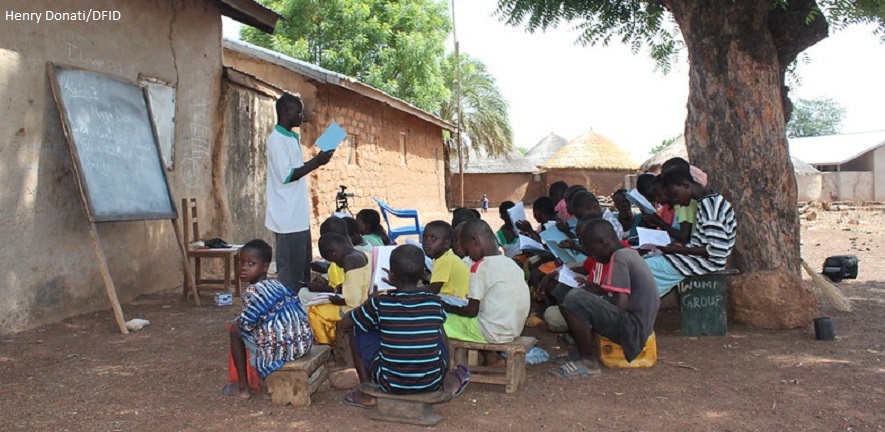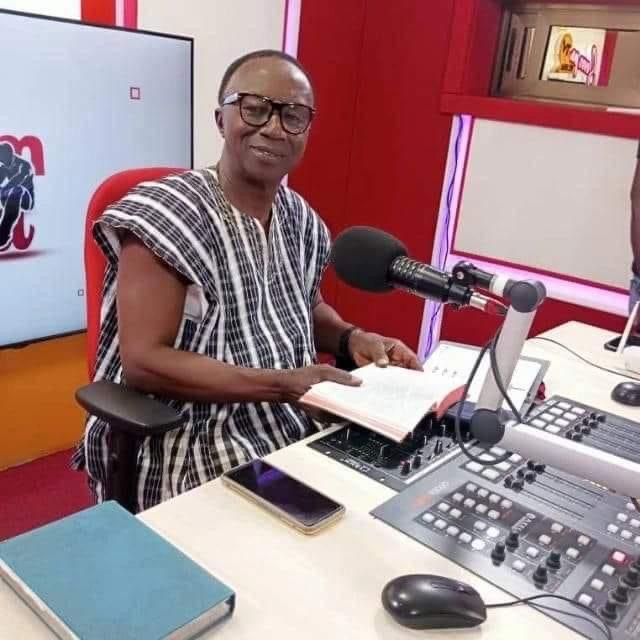Education, according to Malcolm X, is “the passport to the future, for tomorrow belongs to those who prepare for it today.” But many children in Sakagyano, a suburb of Winneba in Ghana's Central Region, do not possess this passport to prepare them for the future.
According to statistics from the Population and Housing Census in 2021, about one million, two hundred and fifteen thousand, five hundred and forty-six children of school-going age in Ghana do not attend school. This includes many of the children in Sakagyano who still do not attend school in 2023.. The situation raises concern since Section 8 of the Children’s Act 1998 indicates that children should not be deprived of access to education.
A visit to Sakagyano on a weekday unveils a worrying sight. Children who are supposed to be in the classroom are engrossed in various activities outside of school. Some of these children help local fishermen at the seaside, while others roam at home or engage in different forms of labour. This scene reflects a sad reality – children in Sakagyano are struggling with access to formal education.
Cause of the Problem
A conversation with some of Sakagyano's residents reveals the reasons why these children are not in school on a weekday. Prominent among these reasons are, the lack of a school in the community and its surrounding communities, the discouraging distance to the closest school, and economic hardships.
"There is no school in this community. Sakagyano as a community, has no school.", Madam Hannah Bonney says.
Further conversations with the residents revealed that the closest educational institutions are far away from the community, making regular attendance a challenge for the children of the community. Opanyin Kojo Daniel, an elder in the community complained; "The absence of a school in Sakagyano has given rise to numerous problems. Many children are compelled to undertake long journeys to access formal education. Consequently, the discouraging distance acts as a deterrent, causing the students to reconsider their commitment to attending school because they cannot cope with the daily stress.”
The distance to school, coupled with economic hardship drives parents and children to give up on the idea of schooling. This is because most of the parents cannot afford the daily transportation fares and sustenance money for their wards when they go to school.
The Seriousness of the Situation
Opanyin Kojo Daniel gives us insight into the seriousness of the situation.
“Some of these young men and women have a lot of potential but because there is no school in the community, they wander aimlessly at night when you expect them to be asleep. In some of these children’s cases, their parents cannot support their education because there’s no money. They also do not have a helper or anyone to sponsor their education. Due to hardships, the parents of such children become vexed when they are asked why their children are not schooling. These children have to work at a young age to fend for themselves and that leaves education out of the picture.”, states Opanyin Kweku Daniel.
Madam Hannah Bonney tells us what these young men and women occupy themselves with when they are not in school and how this negatively affects them.
"When the children do not go to school, they spend the entire day at seaside and come home at night. They go swimming in the ocean almost every day and this has even affected the color of their skin." explained.
She further revealed that the children prefer to spend the day at the beach because they get the chance to steal some of the fish from the fishermen’s catch. They then sell the stolen fish for money. Others also earn money from helping fishermen with their tasks at sea. Due to the money that they make from these activities, many children in the communtiy do not have the desire to go to school.
What makes the situation more alarming is that these children who play about in the community instead of going to school, are often involved in accidents with tricycles and other vehicles that move about in the community. These accidents often result in injuries to the children.
“If even us as adults sometimes get involved in accidents with these tricycles and other vehicles, you can imagine how vulnerable these little ones at home are. We often hear in this community that; a tricycle has injured yet another little child who was playing by the roadside instead of being in school.”, Madam Hannah Bonney laments.
An aerial view of Sakagyano and the shores of the Gulf of Guinea
Ambitions in the Face of Challenges
Despite the disturbing revelations of poverty, economic hardship, and child labour, some of these young men and women still have encouraging ambitions for their lives. An example is Kwame Dampson. Kwame, though a child is now into fishing, while his sisters, Dora and Baaba work as food vendors to survive. Kwame shares with us his reason for dropping out of school.
"I dropped out of school because my school was very far from where I live. Another reason is due to the insufficient sustenance money that I was given when I went to school. Sometimes, I am given as little as three Ghana Cedis or two Ghana Cedis as sustenance money and that cannot do much for me. I make daily trips on foot from here to North Campus and back. I could not cope with this daily stress so I dropped out of school.”
He also shares his hopes of returning to school, and his dreams of becoming a Naval Officer someday.
“I am currently into fishing but I want to work in the Navy as a naval officer. I am saving some money so that I can return to school. I plan to achieve my dream by combining my experience as a fisherman and the certificate that I will gain when I go back to school. That is how I plan to become a naval officer one day.”
Kwame and his sisters are not the only ones in Sakagyano who are experiencing such an ordeal. Another young man, Kojo Bonney, says something similar about this reality that forces him and many other children to choose beachside labor over textbooks.
“I used to go to school but due to hardships, I dropped out. After I dropped out of school, I chose to work at the beach to make ends meet. I later realized that I was earning more from working at the beach than when I went to school. Because of that, I decided to quit school and work full-time as a security person at the beach. I have my problems now. I am also very desperate for money. Hence, I will refuse to go to school if I am approached with the subject. Likewise, a fellow youth in this community who for instance gets five Ghana Cedis as sustenance money for school but gets twice that amount for working at the beach, will weigh these options and choose to drop out of school and work at the beach for money.”
Sadly, everything Kwame and Kojo say, confirms what the other residents have also said about the situation at Sakagyano. It is heartbreaking to know that economic hardships, distance to school, the lack of a school in the community, and other factors have possibly condemned these and many youngsters in the community to a life they do not wish to live.
Requests and Suggested Solutions
These people, however, make their requests and suggestions known to authorities with regard to remedying the situation for them. They request that the government provide a school for their community, or provide a form of free transport for the children in the community to ease daily transportation struggles.
If a school is built for the community, it can prevent an entire generation from being confined to a life of fishing and menial jobs instead of focusing on formal education.
A Call to Action
Their requests for help is not for charity but for the realization of basic rights in Article 25; “All persons shall have the right to equal educational opportunities and facilities.”
The situation at Sakagyano reflects the realities of educational barriers in many other rural and coastal communities in Ghana. This is worrying and needs immediate attention because, the few children who are currently in school, will probably end up like Kojo Bonney, Kwame Dampson, and many other youngsters in the community if the situation persists.
Solving the problem at Sakagyano and other rural and coastal areas in Ghana will not be easy. It will certainly not happen overnight. However, gradual steps can be taken by stakeholders to ease the situation and give some hope to these young ones whom we refer to as our ‘future leaders’.
Sompaonline.com/Samuel Ohene Ewur- Winneba













 Sompaonline.com offers its reading audience with a comprehensive online source for up-to-the-minute news about politics, business, entertainment and other issues in Ghana
Sompaonline.com offers its reading audience with a comprehensive online source for up-to-the-minute news about politics, business, entertainment and other issues in Ghana